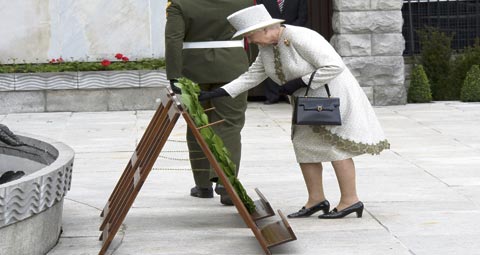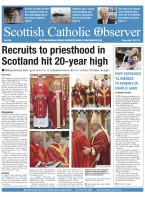May 19 | ![]() 6 COMMENTS
6 COMMENTS ![]() print
print

Cardinal hopes Queen’s visit to Ireland will heal past hurts
Positive initial reaction follows protests over historic visit to Ireland, first by a ruling British monarch in 100 years. Queen's speech below in full. Pic: PA Photos.
Cardinal Sean Brady, the Catholic Church’s most senior clergyman in Ireland, has expressed his hope that the Queen Elizabeth II’s state visit to the country could lead to the ‘healing of the hurts of the past.’
Last night the Queen spoke at a banquet at Dublin Castle of the painful legacy between Britain and Ireland but stressed her ‘deep sympathy’ for victims and the importance of acknowledging the past without being bound by it.
Sinn Féin leader Gerry Adams said he believes British monarch’s sympathy for those who have suffered in the troubled past is genuine.
Arrests were made in the Christchurch area of Dublin last night as some of those protesting against the royal visit clashed with gardaí as the Queen attended the banquet, hosted by President Mary McAleese.
Earlier on the second day of her visit, the Queen, accompanied by President McAleese, laid a poppy wreath at the Irish National War Memorial Garden in tribute to the almost 50,000 soldiers who died in the First World War. They also visited the Islandbridge War Garden (above) and Croke Park sports stadium to commemorated the 1920 ‘Bloody Sunday’ massacre, when British forces opened fire on a crowd killing 14 people. The Queen also met with Irish Prime Minister Enda Kenny in Dublin during her visit.
Among the guests Cardinal Brady joined at Islandbridge were members of the Orange Order and nationalist and unionist politicians from Northern Ireland, who chatted with each other and counterparts from the south. He said the diversity of guests was a refreshing sign of the times.
“When you look around at people representing so many different strata of our society, I found it a very moving ceremony,” he said. “I hope it will lead to other steps towards the final goal of reconciliation and healing of the hurts of the past.
“It emphasises the need that we depend on each other in life for so many things.”
Queen’s speech below:
‘A hUachtarain agus a chairde (President and friends).
Madam President, Prince Philip and I are delighted to be here, and to experience at first hand Ireland’s world-famous hospitality.
Together we have much to celebrate: the ties between our people, the shared values, and the economic, business and cultural links that make us so much more than just neighbours, that make us firm friends and equal partners.
Madam President, speaking here in Dublin Castle it is impossible to ignore the weight of history, as it was yesterday when you and I laid wreaths at the Garden of Remembrance.
Indeed, so much of this visit reminds us of the complexity of our history, its many layers and traditions, but also the importance of forbearance and conciliation. Of being able to bow to the past, but not be bound by it.
Of course, the relationship has not always been straightforward; nor has the record over the centuries been entirely benign. It is a sad and regrettable reality that through history our islands have experienced more than their fair share of heartache, turbulence and loss.
These events have touched us all, many of us personally, and are a painful legacy. We can never forget those who have died or been injured, and their families. To all those who have suffered as a consequence of our troubled past I extend my sincere thoughts and deep sympathy. With the benefit of historical hindsight we can all see things which we would wish had been done differently or not at all.
But it is also true that no-one who looked to the future over the past centuries could have imagined the strength of the bonds that are now in place between the governments and the people of our two nations, the spirit of partnership that we now enjoy, and the lasting rapport between us. No-one here this evening could doubt that heartfelt desire of our two nations.
Madam President, you have done a great deal to promote this understanding and reconciliation. You set out to build bridges. And I have seen at first hand your success in bringing together different communities and traditions on this island.
You have also shed new light on the sacrifice of those who served in the First World War. Even as we jointly opened the Messines Peace Park in 1998, it was difficult to look ahead to the time when you and I would be standing together at Islandbridge as we were today.
That transformation is also evident in the establishment of a successful power-sharing executive in Northern Ireland. A knot of history that was painstakingly loosened by the British and Irish Governments together with the strength, vision and determination of the political parties in Northern Ireland.
What were once only hopes for the future have now come to pass; it is almost exactly 13 years since the overwhelming majority of people in Ireland and Northern Ireland voted in favour of the agreement signed on Good Friday 1998, paving the way for Northern Ireland to become the exciting and inspirational place that it is today.
I applaud the work of all those involved in the peace process, and of all those who support and nurture peace, including members of the police, the gardai, and the other emergency services, and those who work in the communities, the churches and charitable bodies like Co-operation Ireland.
Taken together, their work not only serves as a basis for reconciliation between our people and communities, but it gives hope to other peacemakers across the world that through sustained effort, peace can and will prevail.
For the world moves on quickly. The challenges of the past have been replaced by new economic challenges which will demand the same imagination and courage.
The lessons from the peace process are clear; whatever life throws at us, our individual responses will be all the stronger for working together and sharing the load.
There are other stories written daily across these islands which do not find their voice in solemn pages of history books, or newspaper headlines, but which are at the heart of our shared narrative. Many British families have members who live in this country, as many Irish families have close relatives in the United Kingdom.
These families share the two islands; they have visited each other and have come home to each other over the years. They are the ordinary people who yearned for the peace and understanding we now have between our two nations and between the communities within those two nations; a living testament to how much in common we have.
These ties of family, friendship and affection are our most precious resource. They are the lifeblood of the partnership across these islands, a golden thread that runs through all our joint successes so far, and all we will go on to achieve.
They are a reminder that we have much to do together to build a future for all our grandchildren: the kind of future our grandparents could only dream of.
So we celebrate together the widespread spirit of goodwill and deep mutual understanding that has served to make the relationship more harmonious, close as good neighbours should always be.












I think its great for ireland and the UK helps heal the hurt,nothing but good can come from it
as long as the british monarchy rules in northern ireland, the past will never be healed and there is no point in saying that friendships and relationship with each other will make us great friends coz it never will. but it is great that she has visited the most poignant places of our history and for that i applaud her, its not just 1916 and the war of independence, its all the years that the monarch ruled this country. they let 4 million irish people starve or emigrate during the famine years and done nothing to stop it, nothing. our war against them was nothing in comparison to what they done to us and that should be nd will be remembered by the irish. i have english friends and i get on great with them and i work with english and they are grand.its the monarchy we have a problem with, not the actual english people.
The Queen’s Speech was brilliant from the moment she pronounced the aspirate in “chairde.” It acknowledged our history which has oppressed us for too long. It showed acute awareness of political reality and expressed empathy with the need of ordinary people to live and work in peace. She spoke for those of us with ancient and more recent ties of blood and friendship in England, Scotland, Wales and Ireland. This speech is as historically important as the personal efforts of King George V to bring about a peaceful ending to the War of Independence. Long live the Queen!
Bualadh bos dos na daoine i mile naoi deag is a se deag mar ta na sasanigh imithe san eire!!!!
“its the monarchy we have a problem with, not the actual english people.”
So you have forgiven Oliver Cromwell for what he did did to the Irish people because he was not a king?
David Stevens, dun do bheal. Na hEireannaigh abu!!!!